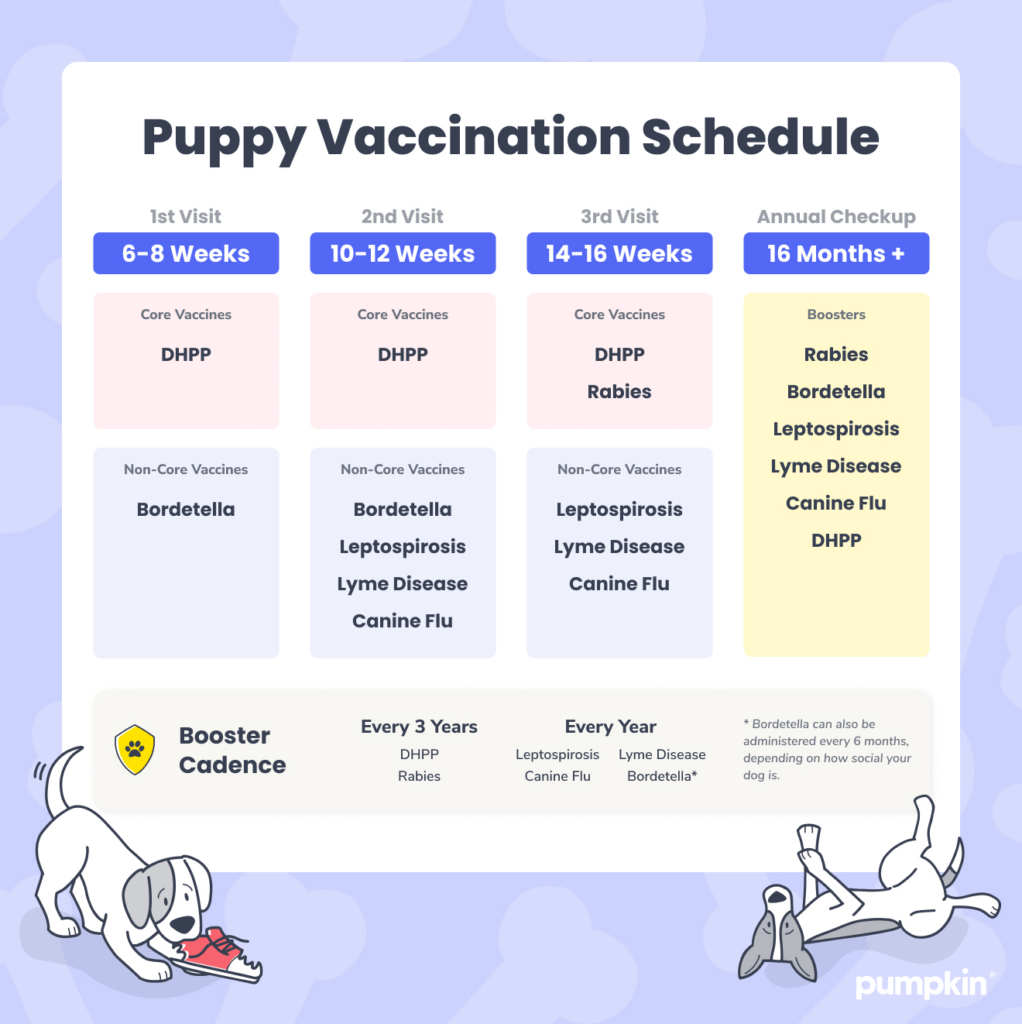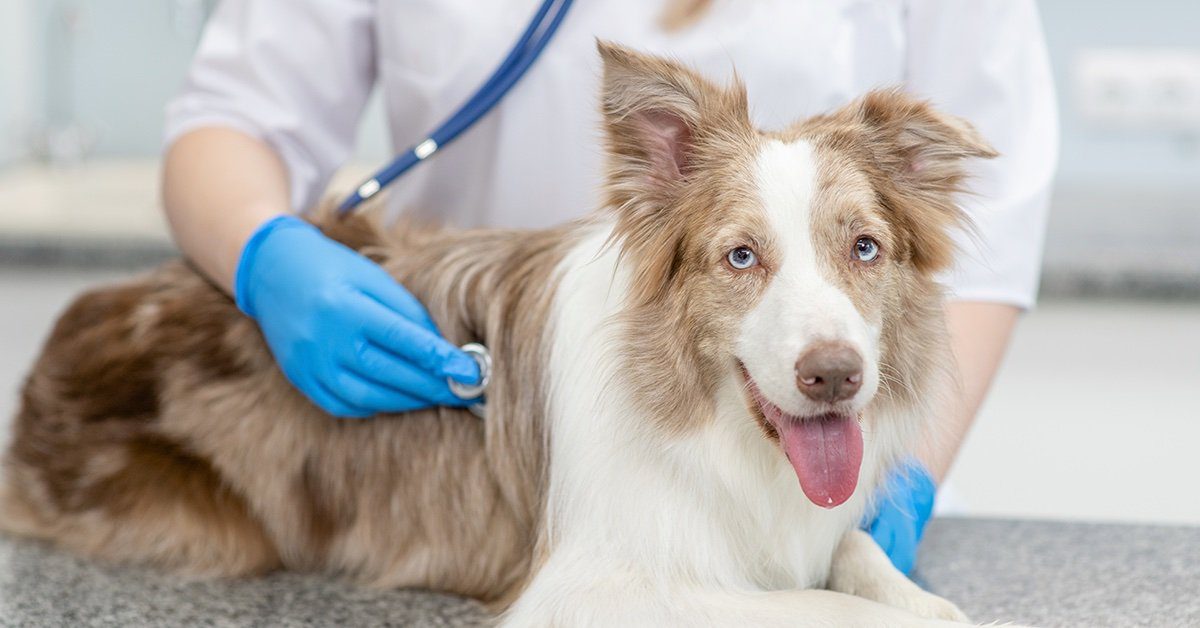Key Points
- Healthy adult dogs should have a vet checkup at least once a year.
- You can expect your puppy to have their first vaccine between 6-8 weeks of age.
- If your dog has any unusual symptoms such as lethargy, loss of appetite, or severe pain, you should check in with your vet straight away.
Even though many of us avoid it, we all know we should go to the doctor and dentist for regular checkups. Preventive care helps us stay healthy and identify potential health problems before they become emergencies.
The same is true for our dogs, and your favorite pup relies on you to get the healthcare they need. According to the American Animal Hospital Association (AAHA), routine preventive vet care helps our pets live longer. This means more snuggles, walks, and games of fetch.
So, how often should a dog go to the vet?
Generally, your dog should have a wellness checkup at least once a year. However, this can vary based on your dog’s age, lifestyle, and health conditions.
Below, we’ll walk you through how often you need to take your dog to the vet based on their age.
Why are annual checkups important?
Adult dogs between 1-7 years old typically need annual check-ups. On average, routine vet visits cost between $25-$186 depending on your location and the services provided.
At these annual dog checkups, your vet may do the following:
Physical exam: This includes taking vitals, a coat and skin examination, and a weight check. The vet will also listen to their heart and lungs and check their joints and bones. This exam can reveal ticks and fleas, common skin problems, mobility issues, and new growths or lumps.
Fecal test: This test identifies intestinal parasites, including hookworms, whipworms, and roundworms. Ask your vet if you should bring a fresh fecal sample with you to the appointment.

Parasite prevention: Regular preventative treatments protect your pup from parasites such as heartworms, fleas, and ticks. Most dogs should be tested for heartworm disease once a year, even if they receive regular heartworm treatments.
Vaccines & booster shots: Your dog will need a booster of the combination vaccine one year after they’ve completed the puppy series. They also need a booster every 1-3 years after that.
Your veterinarian can help you decide if any other vaccinations will be beneficial for your pet’s health. Dogs that attend daycare or boarding facilities may also be required to provide proof of the kennel cough vaccine. Some facilities require this every six months.
If your dog has underlying health issues, you may need to visit the vet more frequently for testing or treatment.
Remember, it doesn’t matter if your dog hasn’t been to the vet in months or years. It’s never too late to bring them in for a checkup.
How often should puppies go to the vet?
Between the ages of 6-16 weeks old, your puppy should go to the vet every 3 or 4 weeks.
These visits will include scheduled vaccinations and wellness exams. At these puppy vet visits, you’ll learn about the health needs of your new pet. The vet will be happy to discuss:
- Providing a balanced diet
- Normal growth and development
- Parasite and disease prevention
- Behavior and training
- Toilet training
Some veterinary clinics offer puppy training sessions. Puppy school can help you train and socialize your dog while teaching them positive behaviors.
How often do dogs need vaccines?
The AAHA recommends five core vaccines for dogs, and the regimen generally starts when puppies are 6-8 weeks old.
Puppies begin with a combination vaccine that protects against canine distemper virus, parvovirus, and adenovirus-2. This combination vaccine may also include protection against the parainfluenza virus.
You’ll need to bring your puppy to the vet’s office every 3-4 weeks for booster shots until they’re about 16 weeks old. Then, when your pup is over 3 months old, they’ll receive a rabies vaccine.
Depending on your puppy’s health risks, lifestyle, and your location, your vet may also recommend non-core vaccines. These may include flu, Lyme disease, or Bordetella vaccines.
Check out our puppy vaccine schedule to keep track:

After your puppy’s vaccination series is complete, they may return to the vet for spaying or neutering. You can schedule this surgery when your dog is anywhere from 6-24 months old.
How often should senior dogs go to the vet?
Senior dogs are generally 8 years old and above. So, how often should a senior dog go to the vet? Around twice a year.
Older dogs are more prone to illness and injury, so seeing your vet semi-annually can help address any issues before they get worse.
During these wellness visits, your vet will perform a complete physical exam, paying special attention to areas that typically affect older dogs. For example, your vet will look closely at your dog’s teeth to see if there are signs of dental disease.
They’ll also check their weight, skin, and nails and keep an eye out for mobility issues or joint pain. Your veterinarian may also run annual blood and urine tests to check their internal organ function.
Finally, depending on your dog’s overall health and disease risk, additional booster shots, x-rays, and parasite control may be recommended.
When to take your dog to the vet immediately
Hopefully, you’ll only have to visit the vet’s office for your dog’s regular check-ups. However, emergencies can occur, and if you know what to look for you can act quickly.
According to the American Veterinary Medical Association (AVMA), here are some examples of pet health emergencies that demand immediate veterinary care:
- Your dog has a broken leg or can’t walk like normal
- Your dog seems to be in severe pain
- Your dog is seizing
- Your dog is unconscious and won’t wake up
- Your dog has an injury to their eye or a sudden decrease in vision
- You think or know your dog has eaten something poisonous (e.g. antifreeze, chocolate, rat poison)
- Your dog has severe vomiting or diarrhea that won’t resolve on its own
- Your dog refuses to drink for 24 hours or more
- Your dog seems to be choking or is having trouble breathing
- Your dog is bleeding and it won’t stop
- Your dog has blood in their urine or is coughing up blood
- Your dog has been hit by a car, a large object, or attacked by another animal
And don’t forget, you know your dog best. If you think something is wrong or out of character, it’s worth talking to your vet.
Planning for a healthy future
When you adopt a new puppy, you’re making a commitment to their health and well-being for the rest of their life. Besides, diet, training, and socialization, you’ll also need to take your dog in for regular vet visits.
Your relationship with your vet will be long-term, so it’s important that you find someone you trust. By starting these visits from puppyhood, your dog will get the best care throughout their lifetime.
From those first puppy vaccinations to spaying/neutering to senior support, preventative care can reduce the risk of future illnesses. And if there’s ever an emergency, your vet will be there to offer support. When the unexpected happens, Pumpkin Dog Insurance plans can help cover the costs of eligible vet bills, letting you say yes to the best possible care.




